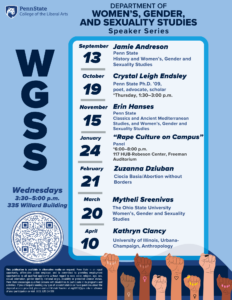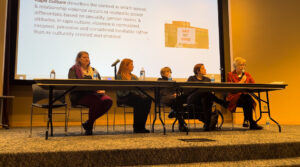WELCOME TO
THE DEPARTMENT OF
WOMEN'S, GENDER,
AND SEXUALITY STUDIES
We are committed to creating an inclusive campus community that acknowledges the inherent dignity in every person.
Our faculty engages in research, pedagogy, and service with attention to social justice to contextualize and challenge sexism, transphobia, ableism, classism, and racial oppression. Our students learn through the development of critical and analytical skills, creative approaches to problem solving, and the ability to articulate productive socio-political alternatives.
The Department of Women’s, Gender, and Sexuality Studies at Penn State welcomes all people, regardless of gender, race, nationality, religion, or sexual orientation.
Our department is committed to creating an inclusive campus community that acknowledges the inherent dignity in every person. Our faculty engages in research, pedagogy and service with an attention to social justice to contexualize and challenge sexism, transphobia, ableism, classism, and racial oppression. Through our work, we aim to move the discourse away from mere tolerance, celebration or appreciation of difference to a deeper understanding and critique of discrimination, intolerance, and inequality in the historical and contemporary global society.
We are committed to working with others in our community on meaningful efforts to promote a department and a campus that validates and supports everyone, and we are dedicated to achieving equity and respect for every individual of our society, especially those who identify as LGBTQ, African American, Latinx or other marginalized identities.
The recent withdrawal of U.S. military forces from Afghanistan and the subsequent takeover by the Taliban has prompted extensive coverage of the “fate” of that nation’s women and girls, as though they have no role in determining their own futures. Unfortunately, the coverage follows the familiar, troubling narrative of Muslim women as passive victims in need of “protection” and “rescue” by the West. Moreover, this impetus to “rescue” is falsely labeled as “feminist,” a claim we have firmly rejected. Nearly twenty years ago, on November 17, 2001, Laura Bush delivered a radio address – one normally delivered every week by her husband, the President of the United States – to “kick off a worldwide effort to focus on the brutality against women and children by the Al Qaeda terrorist network and the regime it supports in Afghanistan, the Taliban.” She described the “horror” experienced by “civilized people throughout the world” at the plight of those women and girls and reminded listeners of their obligation to speak out. “The fight against terrorism,” she noted, “is also a fight for the rights and dignity of women.” All Americans were called on to therefore join her family “to ensure that dignity and opportunity will be secured for all the women and children of Afghanistan.” In one deft radio address, the former first lady deliberately invoked feminist rhetoric to evoke sympathy but ultimately to justify what would become decades of military intervention, and the devastating aftermath that war brings. The future of Afghan women and girls is once again in the news. What will become of their educational opportunities, their ability to work outside the home, to move freely, to be seen and heard in public? The brutal record of the Taliban is certainly reason for grave concern, but so is the idea that the liberation of women and girls must be tied to US military occupation. As feminist scholars and educators, we must think critically about the complexities – indeed, the messiness – that undergirds this historical moment. The call to simply “rescue” such women and girls is an echo of colonial discourses about Muslim women as passive victims of cultural oppression by Muslim men and not one informed by feminist ethics. Humanitarian aid must be forthcoming, but we must also question the systems of power and militarism that created this crisis in the first place. We must be wary of another calculated and false “feminist” call to “rescue” Afghan women that was used to justify 20 years of war. This is why intersectional feminist scholarship and teaching, and working in solidarity with other feminists, are so important. It is also why the work that we do within the Department of Women’s, Gender, and Sexuality Studies is so crucial. We cannot create a world free of violence and terror unless we are willing to confront and challenge all forms of social injustice, both at home and abroad. We will seek to work in solidarity with feminists in Afghanistan and broader efforts by Muslim feminists to simultaneously challenge the Taliban’s destructive policies in the name of Islam and to resist the reduction of Afghan women to voiceless victims used to justify militaristic solutions, by now so familiar in the media and politics after 20 years of war. There is still much work to be done, but in community, we will meet the need ahead of us.
In solidarity,
Alicia C. Decker,
Department Head










